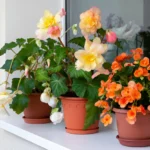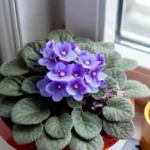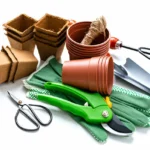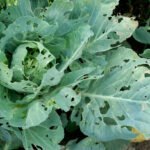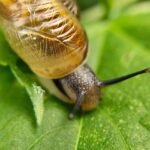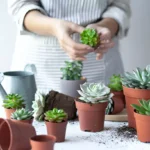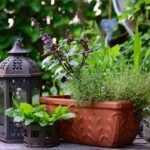Pests can enter your indoor plants in many ways. Your carelessness about pets can even kill your plant. Do you want your house plant to die? Then, keep reading this to save your plant. Why do pests attack your plants? How do they come to your house? How can you kill them? How can I kill them the most effectively? We have tried to answer all these questions in your mind in this article. Did you know you can bring home bugs yourself?
Do you bring them, or am I lying?
No, I’m not lying. When you buy a plant from a nursery or online and bring it home, pests can come with it. If you allow them to stay in the house without carefully checking the leaves, the insects on the plant will be released to other plants and thus can spread to all your houseplants.
Overwatering plants can also attract plant pests. How?
When you overwater your plants, they become moderately wet. Moderate wetness means rotting roots and overly moistened soil, which results in mould in the media and damp soil that attracts insects. Some insects and pests can also fly in the air and spread eggs and larvae from one plant to another. They spread so fast that you can’t even imagine. There are also many other ways pests can attack your houseplants.
What is a Pesticide?
Pesticides are poisons in liquid or powder form that kill harmful insects and pests on plants. They are completely chemically prepared and can be applied at different stages of plant growth. Insecticides can destroy all components of insects, including eggs and larvae.
Pesticides can be divided into two categories:
Organic pesticides and chemical pesticides.
What Pests Attack Houseplants More?
Indoor plants can be infested with many types of pests known and unknown to you.
For example, mealybugs, mites, scales, aphids, spider mites, loppers, bugs, whiteflies, snails, ants, etc., usually attack more.
Why Do We Use Pesticides?
You will use insecticides to protect and prevent your indoor plants from pest attacks. You saw your houseplant last night with shiny, fresh, green, unblemished leaves, but you woke up in the morning and saw that the leaves were oily (honeydew) and eaten in various places. Your eyes will be about to pop! Who did this? You will search and find pests on your plants. You may need to protect your plants quickly from them and use insecticides for immediate treatment. Insecticides kill harmful insects on your plants by acting directly on their digestive and respiratory systems.
Using pesticides regularly and in the right amount can save your plants from major damage. Insects nest and reproduce on leaves and twigs, and some insects (mites) are invisible to the naked eye. You need to apply pesticides to kill them correctly.
Are Pesticides Harmful to Plants?
Farmers have used pesticides to control insects and pests in their crops since ancient times. Various types of pesticides are used today. Many types of pesticides exist, including organic, synthetic, and chemical.
If used in specific amounts, pesticides do not harm plants. Remember to dilute them with water when applying them to your plants. Over-application of pesticides can cause leaf burn, and excessive mixing with soil can cause root burn. So, you must be careful while spraying or mixing pesticides with soil.
When to Apply Pesticides to Houseplants?
You will treat the plants with pesticides if you observe insect infestations. You should always move plants away from direct sunlight and then apply pesticides. When you bring new plants home, quarantine and test the leaves before moving them to all your plants. Spray insecticide when you see insects. You can change the affected plant when you arrive at the nursery.
Pesticides can be used in moderation with the medium, and pests cannot attack the plant’s soil. You should mix the powdered insecticide in the medium with a chopstick once every 10-15 weeks.
Spray your plants with organic pesticides once every 7-10 days. If the pesticide is an artificial insecticide, you can spray it twice a month.
However, when you see insect infestation on the plant, crush it with your hands and spray pesticide all over the leaves and branches.
Does spraying pesticides affect plant growth?
A little overspray of organic pesticides or biopesticides will not have much effect on plant growth. However, if artificial and chemical pesticides are applied in excess, your plant’s leaves may be burnt, and growth may be suffered. There is a misconception among many gardeners that applying pesticides causes plant growth, but it’s wrong.
Yes, you can grow plants using fertilizers but not pesticides. Over-applying pesticides can damage your plants.
Are Pesticides Safe for Humans?
You may need to apply pesticides if your indoor plants are infested with pests. While spraying pesticides on plants, we see that they get into the air, and the poisonous water gets on the furniture around the plants. Again, spraying against the wind can cause the pesticide to stick to different parts of your body.
Will Pesticides Harm Our Bodies?
Pesticides are made to kill insects and are labelled as harmful to humans. If they get into your nose, mouth, or eyes, they can cause burns, and if they get into your stomach, they can cause serious damage. If you have small children in your home, keep them out of reach, and it is best to keep the pesticides inside a tight container box so that they are out of the reach of your naughty child.
Are Pesticides Harmful to Animals?
Pets are more enthusiastic about house plants. When you spray, they notice from a distance, and when you are busy with other activities, the pesticide can enter their bodies through the nose and mouth when they bite or smell the leaves of the plant. That’s dangerous.
Pesticides are harmful to humans and pets. If they get into your pet’s stomach, they may cause vomiting or diarrhoea, followed by respiratory and kidney problems. When you spray, go outside the house with the affected plant and spray.
Also, keep pets away when you spray plants inside your home.
Do You Use a Preventive Insecticide?
To protect your favourite houseplants from pest attacks, you can regularly spray them with insecticides. Neem oil works best.
Dilute neem oil with water and spray it on all the plants in your house 2/3 times a month. As a result, harmful insects will not be able to attack. Neem oil is made entirely of organic ingredients, so it does not disrupt their photosynthesis process when applied to plants. However, you should remember that neem oil is ultimately one type of oil, and it can harm plants if you continue to use it in excess.
You should use it to prevent pests from attacking plants, but I highly recommend not applying neem oil if insects attack your plant. It would be best to choose an insecticide that works immediately and kills the insects.
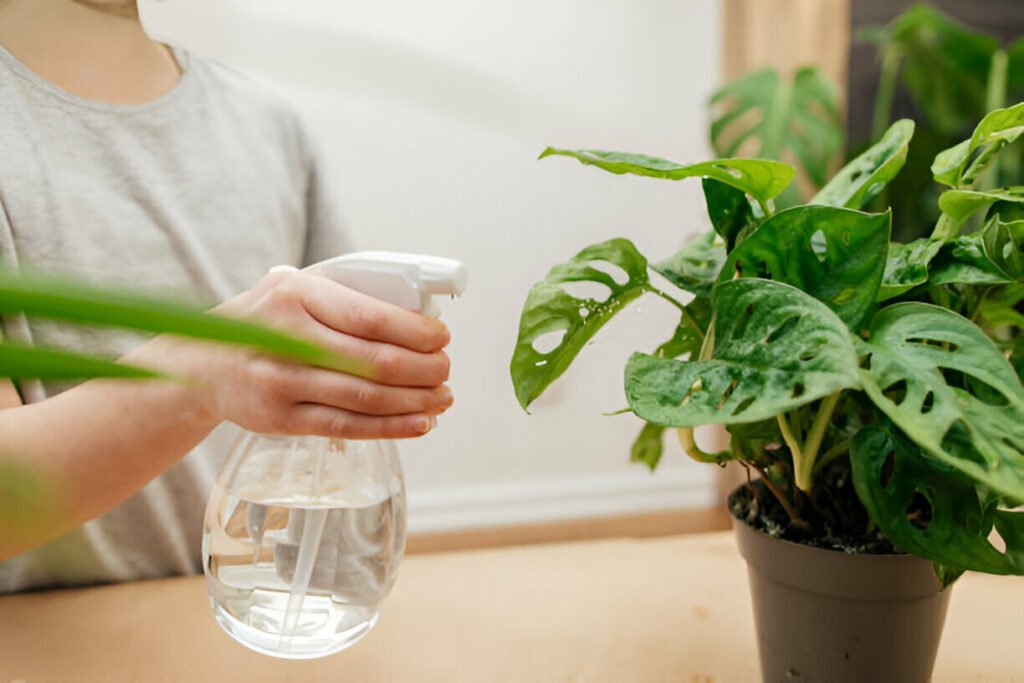
What Homemade Pesticide Do You Use?
You can protect your plants from pest infestation if you take care of your plants regularly. Always remember to check the leaves when watering the plants. Look around the tree from branch to branch. Some insects are so small that you can’t see them.
After catching them, when they get bigger, put a magnifying glass like mine and check down on the leaves. You can quickly identify small insects and take action at the right time. We are indifferent to the care of the tree; such insects are seen in the forage plant.
But they don’t come to your plant in a day, so if you check regularly, it may take you a few days to catch them.
If you don’t want to use chemical and artificial pesticides because you have small children and pets at home, which one should you use?
See what we’re saying below:
- Neem Oil: Neem oil is completely organically made and 100% safe for your plants. Mix it with water to make a mist.
- Chilli powder: Chilli powder helps repel insects. You can take pepper powder from the kitchen and dilute it with water in your mister. It is very effective for mealybugs and aphids.
- Dish soap: Dish or dishwashing soap is more or less available at home. Add a few drops of dish soap to your spray and use any well at home. Dilute with water and apply.
- Neem leaves: Neem leaves possess natural properties that we do not know. Collect some neem leaves if you don’t have neem oil in your house but have a neem tree. Boil the neem leaves in water for 5-10 minutes in the oven, and when the water turns greenish, remove it from the oven. Cool the neem leaf water; when it cools down, strain it, dilute it with enough water, and spray it.
- Cinnamon Powder: We all use cinnamon to enhance the taste of food. Cinnamon powder can also repel insects. Apply one teaspoon of powder with 1-1.5 liters of water.
- Hydrogen Peroxide: If you have hydrogen peroxide at home, you can repel plant pests.
Read Our Article: How Hydrogen Peroxide Revolutionizes Plant and Garden Care: Tips | Tricks | Uses
Some Final Tips
While buying plants from a nursery, check the leaves and soil. Always buy plants with fresh leaves and no fungal attack in the plant selection area.
Quarantine the plant for at least 7-15 days after bringing it home.
Check the leaves of all plants in your home at least twice a week. At least once every seven to ten days, take your plant to the sink or bathtub and mist it with the pressure the plant can tolerate. The water pressure will wash away the insects. Take your sink and soak your plants in dishwashing liquid by closing the drains. Only dip the leaves and branches in water by covering the medium and pot with plastic.
A giant magnifying glass is a must. Keep both powder and liquid pesticides at home. When applying pesticides, remember your safety. Wear Masks, gloves, and transparent glasses to avoid direct contact. Take a shower and wash your clothes after spraying the insecticide.
You can spray the plant in the bathroom to spray the insecticide, and after spraying, you can wash the bathroom walls and everything with water.
Keep away from pets; if accidentally ingested, seek immediate veterinary attention. Check the leaves before bringing outdoor plants indoors, and try to get fewer plants in at a time, as plants can quickly become attacked by outdoor pests. Check the expiration date on the pesticide bottle before applying the pesticide.

